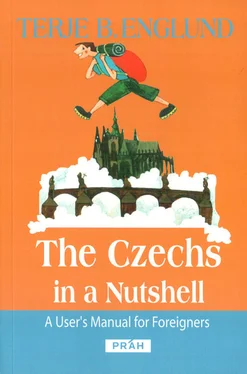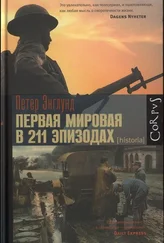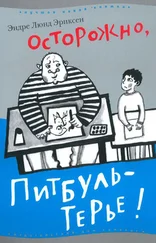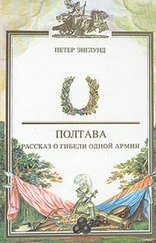It’s easy to understand how this treason embittered the Czechs. First, they suffered the humiliation of being pressed to cede a large chunk of the country to Nazi Germany, and then they endured six years of occupation, which cost 120,000 Czechs — 78,000 of them of Jewish origin — their lives. In the Nazi retaliation against Reinhard Heydrich’s assassination in 1942 alone, more than 3,000 people, including all male inhabitants of the village of Lidice, were murdered.
Then add immense material damages and a population boiling with hatred (within the end of 1945, more than 700 collaborators had been executed), and mix it with 40 years of Cold War, when the communist propaganda portrayed Czechoslovakia’s Western neighbours as irreparable militarists, and you can with some tolerance understand why nácek (Nazi) and vepř (pig) still are among the slang words used for a German.
Yet the end of the Cold War has undeniably warmed most Czechs’ relationships to the Germans. After the Velvet Revolutionin 1989, Germany has become by far the largest foreign investor in the Czech Republic and there was, quite surprising, only sporadic grumbling (see: Klaus, Václav) when the German icon Volkswagen took over the Czech national treasure, Škoda Auto, in 1993. Today, German-owned Škoda accounts for almost 10 percent of the Czech Republic’s total exports.
“Our mutual relations have definitely stabilized,” Václav Houžvička, leader of the Czech-German Forum for Discussion, recently told the Mladá fronta Dnes daily. “But unfortunately, there are still certain barriers that hamper the co-operations.”
What Houžvička calls “barrier” is what less diplomatic people would probably call plain Germanophobia. There is a widespread conviction among Czechs that the German government will someday officially support the evicted Sudeten Germans’ demand that Prague must compensate them for property that was confiscated by Czechoslovakia in 1945 (see: Carlsbad English Bitters). However wild and exaggerated this fear of revisionism might be (only one organization, the militant Wittiko Bund, has publicly demanded compensation), the “Sudeten ghost” wakes up every time there is an election in either Germany or the Czech Republic.
The Germans’ unpopularity is, almost inevitably, also a question of good old envy (see: Egalitarianism). The Eastern German tourists, who until 1989 were happy to buy toothpaste during their visits in Czechoslovakia, have suddenly, thanks to a financial injection from the Western part of Germany, become real Západ'áci — Westerners. When they now come on swift shopping trips to the Czech Republic, they splash korunas about as if they were Monopoly money (some, well, quite a few pay a substantial contribution to the Czech prostitution industry as well), drive fancy cars or even lapse into parvenu behaviour — which is not exactly the recommended way of winning friends among the Czechs.
This feeling of economic inferiority grows even bigger when the common Czech visits Germany. At home, a Czech’s purchasing power is, thanks to the moderate price level, about half that of the common German’s (in 2003). But once over the border, Czechs discover that their purchasing power has shrunk to one fourth of their neighbours’. In Germany, the average welfare recipient is a Rockefeller compared to a Czech teacher with five years university education.
Luckily, the economic differences are slowly but steadily diminishing, but the mental pattern — “poor and humble Czech” vs. “fat and rich German” — has started living its own life. Consequently, “ambivalence” is probably the most apt description of the Czechs’ stance towards Germany and the Germans today.
This is also reflected by a survey published by the Czech Academy of Science’s Sociological Institute in December 2003. When asked whether it was possible to live in peace and harmony with Germany, only 15 percent said it was impossible. But when asked if Germany might represent a threat to the Czech Republic, 40 percent of those Czechs questioned more or less agreed. The percentage skyrocketed to almost 70 when asked whether the Czechs should always be on guard against the Germans, and when it came to the justification of the expulsion of the German minority from Czechoslovakia after the Second World War, a staggering 80 percent of those surveyed had no qualms about it at all.
Does this sound very depressing? Actually, the situation could have been even worse. According to the renowned Dutch Clingendael Institute of International Relations, the Danesand the Dutch have an even more negative stance towards the Germans. And contrary to the Czechs neither country has been ideologically brainwashed and financially ruined by 40 years of communist misrule.
As soon as you get to know some Czechs, you’ll discover that many of them don’t hesitate in the slightest to reel off different qualities that they consider very typical of their fellow countrymen (see: National Identity). Thus, according to common wisdom, the Czechs are an educated, cultivated and broad-minded lot, with a natural flair for democracy (see: Hospoda) and keen sense of humour (see: Švejk, The Good Soldier).
There is, however, one “typical Czech feature” which most people would regard as even more typical than the others: the Czechs are so handy and nimble-fingered and good at improvisation that one might believe they are equipped with golden hands.
Like many other stereotypes, also this one is not entirely without a grain of truth. Just take a look at the magnificent buildings that surround you. Forget that many of the architects were of Italian or Germanorigin — the craftsmen were definitely Czechs! Who built the main part of “new” Vienna in the last part of the nineteenth century? Correct, Czech and Slovakworkers. And which country on this planet has the highest number of engineers per capita? Right again, the Czech Republic.
Actually, the ability to be handy, i.e., mend things in your flat or cottage, fix your car or even build pieces of furniture (a double bed is a safe winner) are all basic elements of the ordeal that divides an average Czech Pepa from a real male . Even though you are two meters tall and a regional champion in boxing, you’ll probably still be considered a sissy if you’re unable to change a leaking seal in your bathroom.
Have you ever wondered why many Czech house-owners keep a shack stuffed with scrap and rubbish in their gardens? Simply because it works as an inexhaustible stock of materials and spare parts when dad needs to get something fixed. Kutilství (“do-it-yourselfism”) also explains the tremendous density of ironmongers and the virtual invasion of foreignchains such as OBI, Hornbach and Baumax in the Czech Republic after 1989.
To be fair, nobody can dispute that there really are lots of handy people in this country. And many a Czech craftsman demonstrates an ability to improvise that dwarfs the qualities of his average Western colleague. The reason for this, however, is not because the Czechs have any natural talents which people of other nations lack (as many people in this country apparently believe). Instead, it seems to be based on two quite obvious facts.
Firstly, since kutilství is commonly regarded as the primary malecreating rite of passage, the mental pressure to become a kutil is strongly felt by most Czech boys. Secondly (and more importantly), the communist era was infamous for its large-scale absence of both decent services and modern consumer goods. When something broke down (which happened all the time), the simplest — and often only — way of fixing it, was to do it yourself. And since the necessary spare parts could usually not be obtained, you had to improvise and find something else.
Читать дальше








![Theresa Cheung - The Dream Dictionary from A to Z [Revised edition] - The Ultimate A–Z to Interpret the Secrets of Your Dreams](/books/692092/theresa-cheung-the-dream-dictionary-from-a-to-z-r-thumb.webp)



